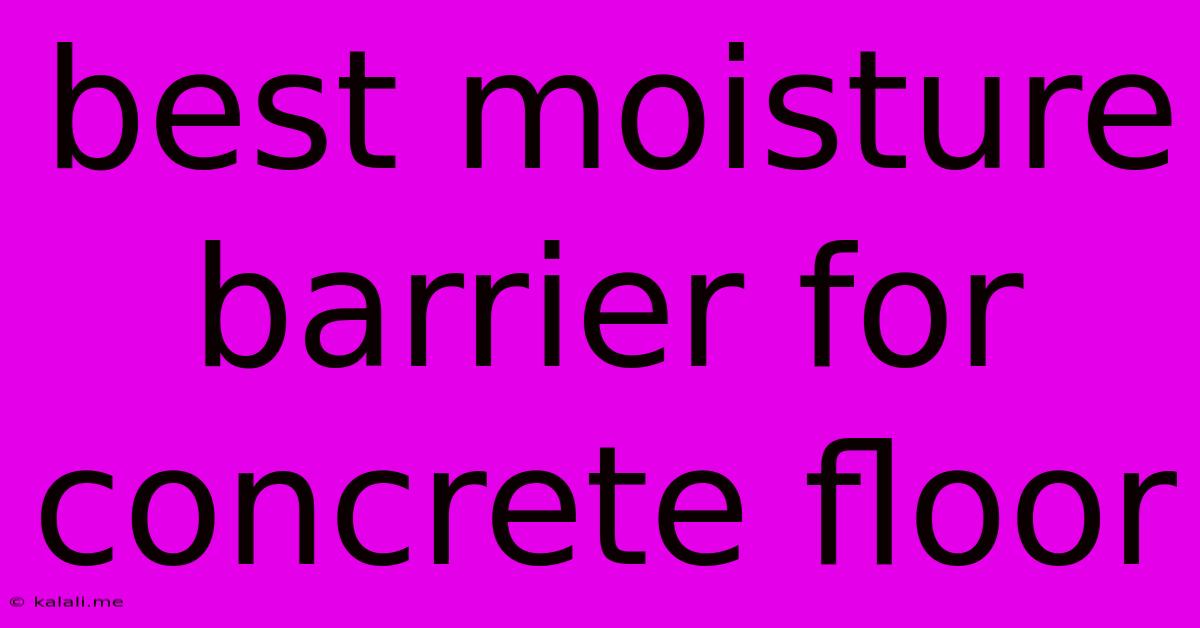Best Moisture Barrier For Concrete Floor
Kalali
May 29, 2025 · 4 min read

Table of Contents
Best Moisture Barrier for Concrete Floor: A Comprehensive Guide
Choosing the right moisture barrier for your concrete floor is crucial for preventing costly damage and ensuring the longevity of your flooring project. Moisture migrating from the concrete can lead to mold growth, warping of wood floors, and the failure of adhesives. This guide explores the best options available, helping you make an informed decision based on your specific needs and budget. Understanding the different types and their applications is key to achieving a successful and durable floor installation.
Understanding Concrete Moisture and its Effects
Before diving into the solutions, let's understand the problem. Concrete is a porous material, meaning it can absorb and retain moisture from the ground. This moisture can vaporize and rise through the slab, impacting any flooring installed on top. The consequences can be significant, including:
- Mold and mildew growth: A damp environment is a breeding ground for harmful mold, impacting indoor air quality and potentially posing health risks.
- Wood floor damage: Moisture can cause wood floors to warp, cup, or rot, requiring expensive repairs or replacements.
- Adhesive failure: Moisture compromises the bond between the flooring and the subfloor, leading to loose tiles, delamination, and ultimately, flooring failure.
- Paint peeling: Moisture can cause paint or coatings applied directly to the concrete to peel and blister.
Best Moisture Barriers for Concrete Floors: A Detailed Comparison
Several effective moisture barriers exist, each with its own strengths and weaknesses. The best choice depends on factors like budget, the level of moisture present, and the type of flooring being installed.
1. Polyethylene Sheeting:
- Pros: Affordable, readily available, easy to install. A good basic barrier for low to moderate moisture levels.
- Cons: Can be prone to tears and punctures, relatively thin and may not provide sufficient protection in high-moisture environments. Not suitable for long-term or high-moisture scenarios.
- Best for: Budget-conscious projects with low to moderate moisture levels, under tile or other non-porous floor coverings.
2. Vapor Retarder Paint:
- Pros: Provides a seamless barrier, relatively easy to apply. Can be a good option for existing concrete floors where removing existing flooring isn't feasible.
- Cons: Requires careful surface preparation, multiple coats may be needed for optimal performance, less effective in extremely high-moisture situations. May not be suitable for all types of flooring.
- Best for: Existing concrete slabs where complete removal and replacement isn't an option.
3. Self-Leveling Underlayment (SLU):
- Pros: Creates a smooth, level surface, excellent for hiding minor imperfections in the concrete. Offers good moisture protection. Provides a stable base for various flooring types.
- Cons: More expensive than polyethylene sheeting, requires careful mixing and application. Not suitable for all substrates. Drying time needs to be considered.
- Best for: Projects requiring a perfectly level subfloor, providing both moisture protection and surface preparation, ideal for tile or luxury vinyl plank (LVP).
4. Modified Bitumen Membranes:
- Pros: Highly effective moisture barrier, excellent durability and longevity. Provides superior protection against moisture penetration.
- Cons: More expensive and complex to install, requires specialized skills and tools. Often used in commercial applications or high-humidity environments.
- Best for: High-moisture environments, large-scale projects, or areas prone to significant water exposure.
Choosing the Right Moisture Barrier: Key Considerations
- Moisture testing: Before selecting a moisture barrier, conduct a thorough moisture test of your concrete floor. This will help determine the extent of the moisture problem and guide your choice of barrier.
- Floor covering: Different floor coverings have different moisture tolerance levels. The choice of moisture barrier should be compatible with the chosen flooring material.
- Budget: Moisture barriers vary significantly in cost. Consider your budget when making your selection.
- Installation expertise: Some moisture barriers, such as modified bitumen membranes, require professional installation. Assess your DIY skills and consider hiring a professional if needed.
Conclusion
Selecting the appropriate moisture barrier for your concrete floor is a critical step in any flooring project. By understanding the different options and considering factors such as moisture levels, flooring type, and budget, you can ensure a successful and long-lasting installation, protecting your investment and creating a healthy indoor environment. Remember to always consult with a flooring professional for personalized advice based on your specific situation.
Latest Posts
Latest Posts
-
P Implies Q Is Equivalent To
May 30, 2025
-
How To Lock Keyboard On Mac
May 30, 2025
-
How To Know Determinacy For Beams
May 30, 2025
-
Shall He Find Faith On The Earth
May 30, 2025
-
What Address To Use On Drivers License
May 30, 2025
Related Post
Thank you for visiting our website which covers about Best Moisture Barrier For Concrete Floor . We hope the information provided has been useful to you. Feel free to contact us if you have any questions or need further assistance. See you next time and don't miss to bookmark.